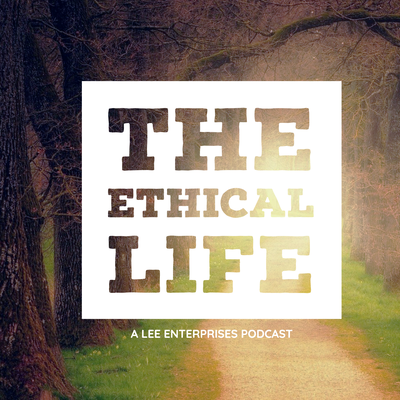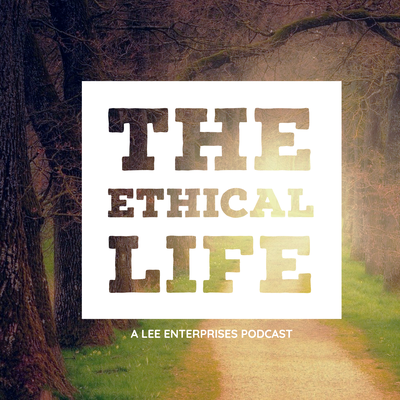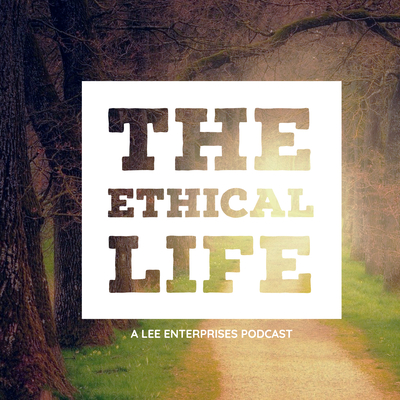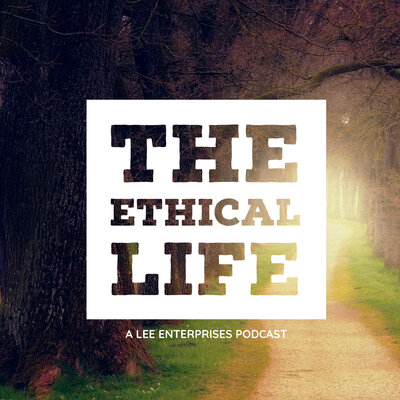
The Ethical Life
Scott Rada is a digital strategist with Lee Enterprises, and Richard Kyte is the director of the D.B. Reinhart Institute for Ethics in Leadership at Viterbo University in La Crosse, Wisconsin. Kyte is also the author of "Finding Your Third Place: Building Happier Communities (and Making Great Friends Along the Way)."
Follow the show on Apple Podcasts or on Spotify.
Most Recent Episode
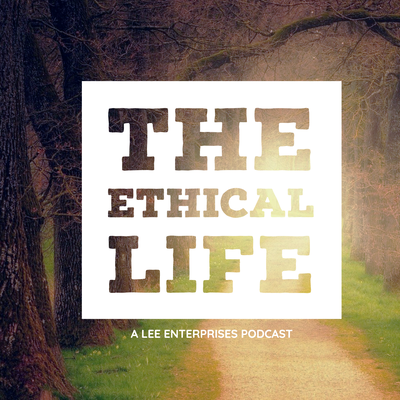
What does it really mean to be a citizen?
Episode 232: Citizenship is a word we hear constantly, especially in political debates, yet it remains surprisingly hard to pin down. Is it simply a legal status, confirmed by documents and protected by law? Or is it something deeper — a set of habits, responsibilities and shared expectations that shape how people live together?
In this episode of The Ethical Life, hosts Richard Kyte and Scott Rada take on that question at a moment when the idea of citizenship feels especially strained. Immigration debates, proposed changes to the U.S. citizenship test and growing frustration with democratic institutions have turned citizenship into a flashpoint, often discussed in stark, binary terms: citizen or not, insider or outsider.
But Kyte argues that this framing misses something essential.
Drawing on ethics, history and lived experience, the conversation explores citizenship as both a legal designation and a moral practice. While legal status defines standing within a political system, democratic life, Kyte says, only survives when people actively participate in it — by staying informed, voting, attending local meetings, understanding how institutions work and accepting the slow, imperfect work of self-government.
The discussion ranges widely, touching on the decline of civics education, disagreements over how American history should be taught and the question of what citizens — both naturalized and native-born — should reasonably be expected to know. Rada raises the uncomfortable reality that many people born in the United States would struggle to pass the same civics test required of new citizens, prompting a deeper examination of what society values and what it neglects to teach.
The episode also looks ahead, with the country approaching its 250th anniversary, and asks how Americans should think about national identity, pride and criticism at the same time. Kyte challenges the idea that acknowledging historical failures requires rejecting the broader democratic project, framing the American experiment instead as an ongoing effort marked by progress, setbacks and responsibility.
More Episodes
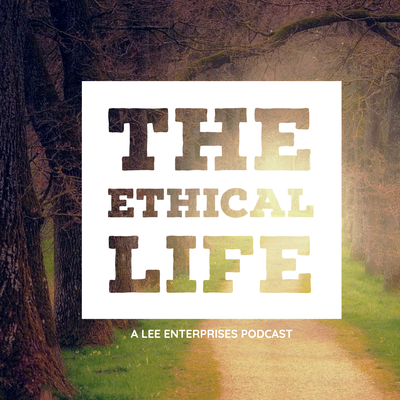
How would you react to these four everyday dilemmas?
Episode 229: Hosts Richard Kyte and Scott Rada are off this week, so we looked back through our show archives and are sharing four of our favorite ethical dilemmas from the past several months.
Topics include whether it’s OK to correct the actions of other people’s children, what advice you’d give your friend who won a lottery jackpot, the ethics around quick conversations and the proper etiquette when staying at an Airbnb.
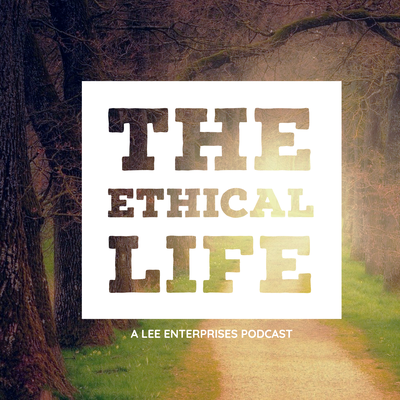
Do we give hard work too much credit and luck too little?
Episode 228: In early January, advice is everywhere. Friends offer encouragement. Social media fills with tidy aphorisms. But beneath the flood of guidance sits an uncomfortable question we rarely confront: How much of what happens to us is actually within our control?
Hosts Richard Kyte and Scott Rada take on that question by examining the role chance plays in shaping lives — and how ignoring it can distort the way people judge themselves and others.
The conversation begins with a familiar moment: times of transition. New jobs, moves, health scares and relationship changes often leave people searching for direction. Those moments, Rada notes, are when advice feels most powerful — and most dangerous. Kyte argues that advice often sounds wiser in hindsight than it truly is, especially when people mistake favorable outcomes for proof that certain paths were inevitable.
Throughout the episode, the hosts explore why stories of achievement tend to emphasize effort and intention while quietly overlooking randomness, timing, and circumstance. That omission, they suggest, fuels harsh self-judgment and unfair assumptions about others. When things go well, people feel deserving. When they do not, blame comes easily.
Kyte draws on philosophy, behavioral research and personal experience to explain how probability, preparation and habit matter — but never operate alone. A discussion of health decisions, including lifestyle changes prompted by medical warning signs, illustrates how agency and uncertainty coexist rather than compete. Doing the “right” things, Kyte says, increases odds but never guarantees results.
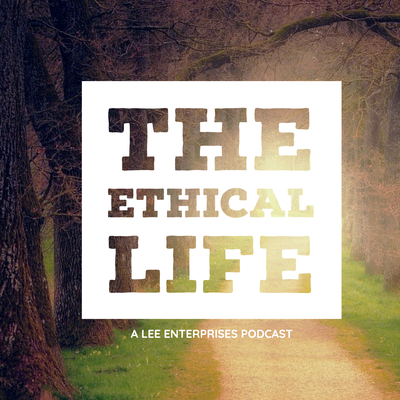
Is Christmas nostalgia a gift or a trap?
Episode 226: As Christmas approaches, memories have a way of resurfacing — sometimes warmly, sometimes painfully, often with more force than expected. In a holiday-themed episode, hosts Richard Kyte and Scott Rada take a close look at why this happens, and what it means for how people live, relate to and care for one another.
The conversation centers on nostalgia — not as a vague sentiment, but as a powerful psychological and ethical force that shapes expectations, family dynamics and personal well-being during the holidays. Drawing on recent psychology research, personal stories and everyday experiences familiar to many listeners, the hosts examine why memories tied to Christmas feel especially vivid and emotionally charged.
The hosts explore how holiday traditions — from meals and decorations to music and family rituals — can ground people in connection and continuity. Remembering loved ones who are gone, revisiting childhood experiences or repeating familiar customs can offer comfort and a sense of belonging. At its best, nostalgia helps people understand their own story and motivates them to create meaningful moments for others in the present.
But the episode also confronts the darker side of holiday remembering. Idealized memories can distort reality, create unrealistic expectations and quietly turn celebration into pressure. When people chase a version of the past that never fully existed, disappointment often follows — especially when family relationships are strained, gatherings fall short of expectations, or loved ones are absent. For some, the holidays heighten loneliness rather than ease it.
Through stories ranging from cherished family recipes to awkward childhood gifts and unexpected acts of generosity, the hosts explore how memory is inherently selective. They consider whether it is acceptable — or even wise — to smooth rough edges when retelling family stories, and how storytelling itself shapes moral identity over time.
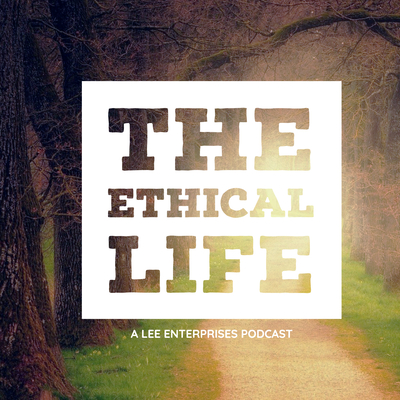
Why does the search for meaning matter now more than ever?
Episode 225: As digital noise continues to shape modern life, the latest episode of “The Ethical Life” turns inward, offering listeners a wide-angle look at how ancient ideas can help people navigate an era marked by distraction, isolation and growing cultural tension.
Hosts Scott Rada and Richard Kyte revisit the seven-part series they released this fall based on Kyte’s public lecture program, “The Search for Meaning.” The series explored a set of foundational concepts — truth, goodness, love, beauty, the soul, justice and nature — each presented through the lens of a major historical thinker.
This week’s conversation steps back to examine the project as a whole. Kyte explains that he launched the lecture series after noticing both a renewed hunger for purpose and a cultural landscape that makes deeper reflection difficult. With entertainment, social media, and algorithmic feeds competing for every spare moment, he says, people feel increasingly unmoored from the community, rituals, and shared practices that once helped anchor their daily lives.
Rada and Kyte trace how that tension surfaced throughout the series. Topics such as goodness and the soul proved more challenging to condense, Kyte says, because they resist simple explanation. Others — including justice and nature — were difficult for the opposite reason: he had too much to say. Yet as the series progressed, he found that the ideas were more interconnected than he expected, each building on the last as the philosophical timeline moved from Socrates to Aldo Leopold.
The episode also looks ahead. Kyte says he has begun the early stages of transforming the series into a book, drawing on months of research and the community discussions that followed each lecture. The core ideas will remain, he says, but he hopes to frame them more explicitly around the pressures of modern life and the need for intentional habits of attention.
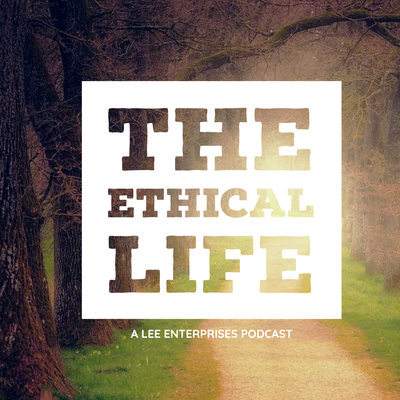
Why are we so reluctant to ask for help?
Episode 224: A recent article by Jason Feifer serves as the starting point for this episode of “The Ethical Life,” where hosts Richard Kyte and Scott Rada examine the quiet struggle many people experience when reaching out for support.
Feifer’s piece argues that the fears holding us back — such as imposing on others, appearing incompetent, or being judged — are often misplaced. In reality, offering assistance tends to strengthen relationships rather than strain them. Rada and Kyte use that insight to explore why hesitation remains so common and what it reveals about modern life.
Rada opens the conversation with a story from Thanksgiving, when he asked a relative to pass the butter while preparing mashed potatoes. The request was trivial, yet it offered a striking example of Feifer’s point: rather than being put out, the relative felt useful and included. That small moment reflects broader research cited in the episode, including a study featured in The New York Times, which shows that people who help typically feel more satisfied and appreciated than those who request support.
Kyte connects the issue to cultural forces, noting that American society often elevates self-reliance as a virtue. Many people, he says, absorb the message that competence means handling everything alone, even when collaboration would be healthier. He recalls his experience trying to stabilize a struggling nonprofit as its interim leader. Although he initially tried to shoulder too much himself, he soon realized that without asking others to join in, the organization couldn’t build the collective capacity it needed.
The episode also highlights how interdependency forms through everyday social rituals, including children’s birthday parties. Rada explains that critics once argued such celebrations encouraged selfishness. Instead, as Feifer notes — and the hosts echo — these gatherings helped establish mutual obligations among young peers, teaching them both to receive recognition and to reciprocate by showing up for others.
Listeners also hear practical guidance on making responsible and thoughtful requests. The hosts discuss the SMART framework — specific, meaningful, action-oriented, realistic and time-bound — which helps ensure outreach feels respectful rather than burdensome. Kyte emphasizes that clarity is especially important for volunteers, who want to know not just that they’re needed, but how they can be genuinely useful.
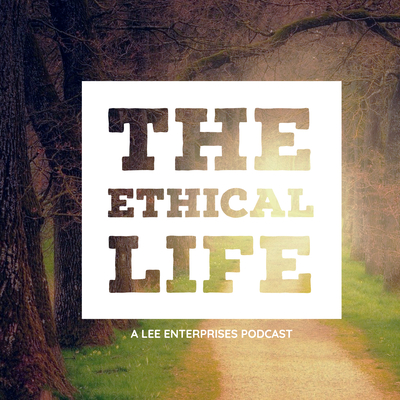
Does returning to nature help us reclaim a sense of meaning?
Episode 223: Hosts Richard Kyte and Scott Rada take on a modern problem that feels both familiar and persistent: why so many people feel unmoored despite busier lives than ever. Their conversation explores whether stepping outside — even briefly — can provide a clearer path to reflection, balance and personal insight.
The episode wraps up the show’s occasional series inspired by Kyte’s lecture program, “The Search for Meaning.” Earlier discussions explored justice, truth, love and beauty. This week, the focus turns to the natural world, which Kyte argues offers lessons not just about the environment, but about how people understand themselves.
Kyte explains that outdoor settings operate on rhythms vastly different from those that dominate our daily lives. Wildlife, landscapes and seasonal change create an environment that moves at its own pace — slower, quieter and resistant to human control. That contrast, he says, forces people to shift from constant activity to simple observation, a state many find both uncomfortable and deeply restorative.
Rada, attending Kyte’s recent lecture on the topic, shares stories from the audience discussions, including one student who began spending nights in a hammock on the bluffs above La Crosse. The stillness startled him at first, but ultimately became a source of comfort and clarity. Kyte notes that such moments push people to confront their surroundings without distraction and, in the process, learn something about their own reactions, fears and habits.
The episode also explores the writings of conservationist Aldo Leopold, whose classic “A Sand County Almanac” helped shape modern environmental ethics. Kyte describes Leopold’s belief that understanding the land requires both affection and attention — learning the names of things, noticing seasonal changes and recognizing the ways humans fit within a larger community of living beings.
Listeners hear personal reflections from both hosts, including Rada’s childhood memories of viewing nature through car windows and Kyte’s accounts of encountering wildlife just steps from busy city streets. Together, they argue that meaningful outdoor experiences don’t require remote wilderness or weeklong expeditions. Quiet city parks, early morning walks and small acts of noticing can offer the same rewards.
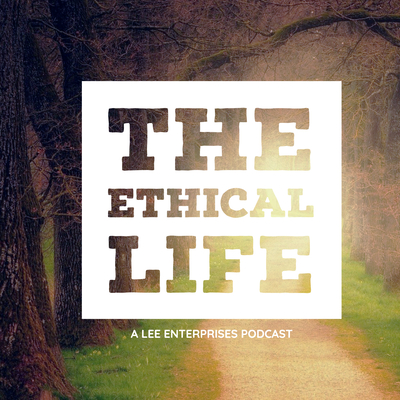
Can we honor history without halting progress?
Episode 222: When a city planner mentioned that a large, developable tract of land might contain Native American artifacts, cohost Scott Rada started wondering how communities decide which parts of the past are worth protecting — and what the costs of preservation might be for the present.
This week’s episode examines the tension between honoring cultural heritage and addressing pressing human needs, such as housing. Rada and co-host Richard Kyte unpack the ethical dilemmas that surface when new development projects run up against the remnants of older civilizations.
Rada argues that while respect for the past matters, society’s first responsibility should be to the living — to families who need homes, jobs and public spaces now. He questions whether stopping or slowing modern projects for the sake of long-buried artifacts truly serves anyone.
Kyte counters that the choice isn’t always binary. He suggests that reverence for the dead and care for the living can coexist, and that certain places — burial grounds, ceremonial sites or historically significant landscapes — deserve deliberate protection, even if doing so requires compromise or delay.
Their exchange touches on Wisconsin’s effigy and burial mounds, the ethics of archaeology and how public policy shapes what gets preserved. Kyte points out that housing shortages typically stem from decades of zoning failures, rather than from the small number of sites deemed sacred or historically valuable. Rada pushes back, asking whether reverence for what once was can sometimes become an excuse for inaction.
The conversation widens to include broader cultural questions: Why do humans feel compelled to memorialize the dead? What promises do cemeteries represent to future generations? And how long should those promises last — centuries, millennia, forever? Kyte argues that physical reminders of our ancestors keep societies grounded in gratitude and perspective. Rada wonders whether our fixation on physical places distracts us from the spiritual or emotional connections that endure regardless of location.
About the hosts
Scott Rada is a digital strategist with Lee Enterprises, and Richard Kyte is the director of the D.B. Reinhart Institute for Ethics in Leadership at Viterbo University in La Crosse, Wisconsin. He is also the author of "Finding Your Third Place: Building Happier Communities (and Making Great Friends Along the Way)."
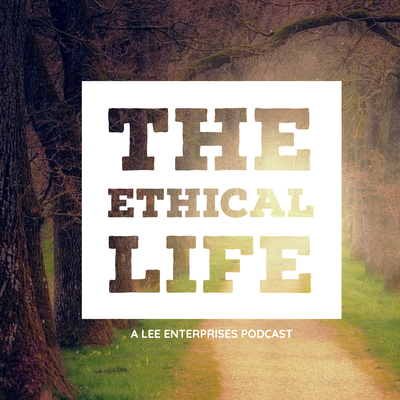
What does justice look like when power distorts what we see?
Episode 221: Hosts Richard Kyte and Scott Rada tackle one of the most enduring moral questions — how wealth, privilege and authority shape our understanding of fairness.
Kyte argues that many of society’s moral blind spots emerge not from ignorance, but from a state of comfort. “When we’re insulated by prosperity,” he says, “we lose the capacity to recognize suffering — and once that happens, our idea of justice starts to shift.”
The conversation begins with the lingering unease around the Jeffrey Epstein case. Rada notes that the story continues to capture public attention years after Epstein’s death, not because of its lurid details but because it still feels unresolved. Why, they ask, does accountability so often end where power begins?
From there, the discussion widens — tracing the roots of moral perception from ancient philosophy to modern politics. Kyte describes how early Christian thinkers introduced the then-radical idea that all people possess inherent dignity, a belief that ultimately challenged institutions built on exploitation and hierarchy. That framework, he says, remains essential if society hopes to confront modern injustices such as human trafficking, forced labor and homelessness.
Rada presses on the practical side of justice: even when we recognize wrongdoing, why is it so difficult to act? The hosts explore examples close to home, from underfunded public defenders to social systems that keep citizens separated by class. Each instance, they argue, reveals how distance — social, economic and emotional — allows inequity to flourish unnoticed.
The episode also connects with Kyte’s ongoing public lecture series, “The Search for Meaning.”
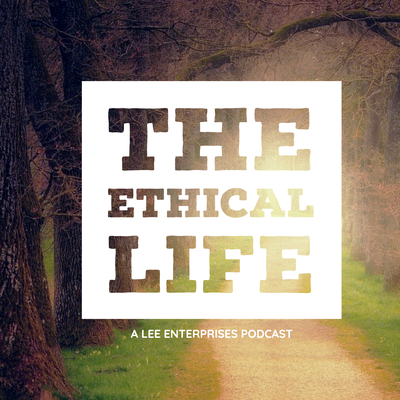
Should we stop telling kids to 'follow your dream'?
Episode 220: For decades, the phrase “follow your dream” has been stitched into graduation speeches, greeting cards and social-media pep talks. But what if that familiar advice is doing more harm than good?
Hosts Richard Kyte and Scott Rada challenge one of America’s most cherished bits of wisdom. Drawing inspiration from a syndicated column by journalist Dick Meyer, the pair consider whether the pursuit of a singular passion has left too many people anxious, disillusioned or convinced that ordinary success isn’t enough.
Kyte argues that telling every young person to chase a dream sets them up for frustration.
“Most people don’t have one burning passion at 18,” he said, noting that interests shift and mature over time. Far better, he suggests, to focus on becoming useful, developing skills and finding work that contributes to others’ well-being.
Rada shares his own early ambitions — becoming a baseball announcer or a TV meteorologist — and how those seemingly unattainable dreams eventually resurfaced in unexpected ways.
The hosts also examine the modern pressure on college students to declare majors and find direction early, even as industries change faster than ever. They discuss the idea of a “growth mindset,” coined by psychologist Carol Dweck, which emphasizes adaptability and resilience over fixed talent or destiny. Both agree that in a world reshaped by technology and automation, curiosity may be the most important skill of all.
By the episode’s end, Rada and Kyte reach a thoughtful conclusion: Purpose isn’t a finish line but a moving target. Staying curious, taking on new challenges and investing in relationships often lead to deeper satisfaction than chasing the perfect career ever could.
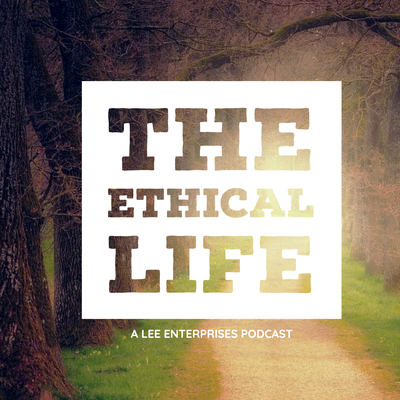
Why do most people believe in souls but rarely talk about them?
Episode 219: In the latest episode of The Ethical Life podcast, hosts Richard Kyte and Scott Rada take on one of humanity’s oldest — and least discussed — questions: What is the soul? This episode is part of Kyte’s lecture series, The Search for Meaning.
It’s a timely conversation, released just after All Souls’ Day, yet Kyte points out that few people actually think about what the day commemorates. Instead, Halloween tends to dominate the season’s attention.
Still, belief in something beyond the physical remains nearly universal. Citing a recent Pew Research Center survey, Kyte notes that more than 80 percent of Americans say humans have souls — a rare point of agreement in a divided nation. But if nearly everyone believes, why is the topic so absent from everyday life?
Rada and Kyte explore that paradox. When people stop viewing themselves as souls, Kyte argues, they begin to see themselves only as bodies — and bodies, he says, “are intrinsically pleasure-seeking.” The result is a culture obsessed with comfort and consumption, rather than meaning. Seeing ourselves as souls, he adds, reminds us that fulfillment comes not from pleasure but from purpose.
The conversation moves from theology to psychology, touching on Sigmund Freud’s fascination with the soul despite his atheism. Freud saw the concept as vital language for describing the wholeness of human experience — including the unconscious mind, which can surface unexpectedly through what we now call Freudian slips.
Listeners will also hear Kyte reflect on stories of near-death experiences reported across cultures and history. These moments, he said, can’t be dismissed easily. “When you find a phenomenon that’s widely reported across cultures, it’s not simply a cultural product,” he said.
Rada presses Kyte on whether the mystery itself — not knowing what happens after death — might actually serve us. Kyte thinks it does. “It doesn’t really help us to know exactly what life after death is like,” he said. “What matters is how we live now.”
Read more: Rick's Kyte's column about souls
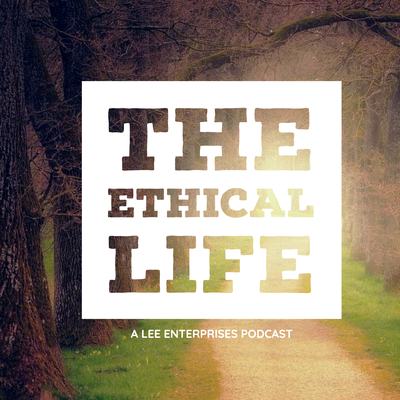
Is convenience eroding our sense of community?
Episode 218: Hosts Richard Kyte and Scott Rada dig into a question that touches nearly every part of modern existence: What happens when a culture built on making life easier begins to lose the very relationships that make life meaningful?
From dishwashers to digital assistants, the 20th and 21st centuries have delivered one innovation after another designed to save time, reduce effort and simplify daily routines. But as Rada and Kyte note, every bit of friction we remove from life comes with a hidden cost. When we no longer share chores, wait in lines or depend on others for small acts of help, we also weaken the bonds that once held neighbors, co-workers and families together.
Kyte points out that humans have reached an unprecedented moment in history: For the first time, many of us are asking whether we have too much convenience. What began with washing machines and supermarkets has evolved into an on-demand economy that prizes speed above all else. And while few people would want to return to hauling water or scrubbing laundry by hand, the hosts argue that our obsession with efficiency may be quietly reshaping our moral landscape.
Their conversation ranges from the decline of repair culture to the rise of social media and hyperindividualism, connecting the dots between broken appliances, eroded patience and fractured civic trust. The episode also revisits the promise and peril of emerging technologies like artificial intelligence, questioning whether they will truly grant us more leisure or instead fuel new forms of productivity.
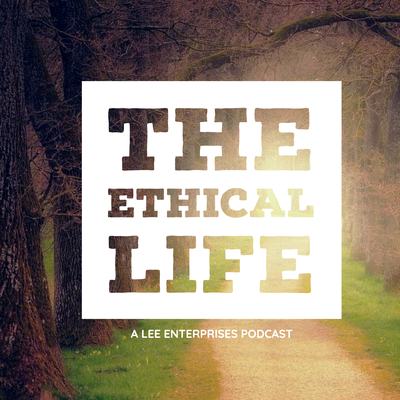
How do we train ourselves to notice beauty in the ordinary?
Episode 217: Hosts Richard Kyte and Scott Rada tackle a subject that’s easy to overlook — beauty. Not the kind of beauty sold in store aisles or filtered through a cellphone, but the kind that stops us in our tracks and makes us forget, for just a moment, about ourselves.
Kyte recalls a recent camping trip during which he stumbled upon a scene so stunning that he instinctively reached for his phone — only to realize he’d left it behind. What followed, he says, was an experience of pure presence: sunbeams slicing through lifting fog, the quiet steps of deer and the realization that no photograph could ever do it justice.
That moment becomes the starting point for a conversation about how beauty reshapes our sense of meaning and morality. “We spend so much time in our own heads,” Kyte said. “Beauty reminds us there’s something significant outside ourselves.”
It’s an idea that stretches from Ralph Waldo Emerson’s essays on nature to Iris Murdoch’s notion of “unselfing” — the idea that paying attention to something beyond our own desires is the first step toward living ethically.
Rada connects those philosophical ideas to everyday life — including the digital habits that make true attention harder to find. He wonders whether seeing a beautiful image on a four-inch screen counts as the same kind of experience. Kyte doesn’t dismiss the value of photography but insists that beauty can’t be possessed, only encountered.
“The moment we try to capture it, we risk losing it,” he said.
The discussion ranges from foggy forests to still-life paintings, from Emerson’s influence on John Muir to the idea that even the way we see other people changes when we cultivate reverence. Along the way, the hosts wrestle with one provocative question: If we begin to see beauty everywhere, does it still feel extraordinary?
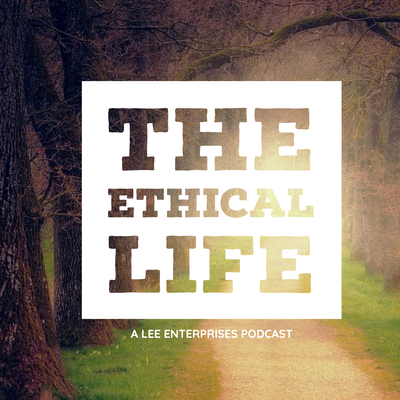
Are we in control of our own decisions or just creatures of habit?
Episode 216: New research suggests that nearly 90 percent of what we do each day happens automatically. From brushing our teeth to checking our phones, most of our behavior unfolds on autopilot — a revelation that raises profound questions about freedom, morality and modern life.
Hosts Richard Kyte and Scott Rada unpack what it means to live ethically in a world governed by routine. The conversation begins with a surprising scientific finding: people make far fewer conscious choices than they believe. Instead, daily actions are guided by patterns — some helpful, others harmful — that free the mind to focus on bigger challenges. But if so much of our behavior is habitual, how much responsibility do we really bear for our choices?
Kyte argues that good habits can actually enhance freedom. Structure, he says, allows people to think more deeply, create more freely and act with less friction. Yet, as Rada points out, the same routines that provide stability can also trap us. They share examples from work and home — from office clutter to the comfort of travel — to show how small disruptions can expose what we take for granted.
The episode also moves beyond theory. The hosts examine modern behavior through real-world lenses: the rise of GLP-1 drugs like Ozempic, the decline of smoking and the ethics of technological fixes that reshape human impulses. Each example circles back to the same question — when we let external forces modify our conduct, do we surrender something essential about human agency?
Kyte also turns the discussion inward, describing how his own writing process depends less on lofty ambition and more on daily discipline. He admits that finishing a book isn’t about sudden bursts of inspiration but about returning to the work, even for a few minutes, every day.
Goals may give direction, he says, but habits sustain momentum. By building steady, repeatable patterns — scheduling lectures, carving out quiet time and creating small external pressures — he transforms intention into progress. It’s a reminder that lasting growth, ethical or otherwise, rarely comes from grand resolutions but from ordinary routines practiced with purpose.
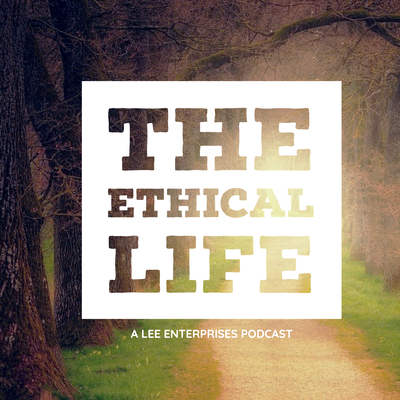
Are we a nation that talks about love but lacks compassion?
Episode 215: Hosts Richard Kyte and Scott Rada explore the disconnect between our private expressions of care and the collective anger dominating politics, media and even day-to-day interactions. Drawing on Kyte’s lecture series The Search for Meaning, the conversation centers on how the philosopher St. Augustine shaped Western ideas about moral love — and why those lessons still matter today.
Kyte argues that we can understand a person’s character by what they love most. Yet, he says, modern society often defines people by what they oppose. Political language is filled with words like “fight” and “battle,” turning opponents into enemies rather than neighbors. Rada and Kyte discuss whether it’s still possible to extend goodwill toward those who hold different views, and how to live ethically in a world that often rewards outrage.
They also explore real-life examples that bring philosophy down to earth — from small moments of irritation, like a cyclist breaking the rules of the trail, to deeper reflections on forgiveness and self-control. Rada recounts how a brief flash of frustration turned into a lesson on empathy after one such encounter, while Kyte connects that impulse to the everyday challenge of seeing others as whole people rather than symbols of conflict.
The episode asks listeners to consider what might happen if compassion guided civic life as much as it shapes personal relationships. Would political discussions sound different? Would disagreements become more productive? And what habits — patience, humility, and curiosity — would make that shift possible?
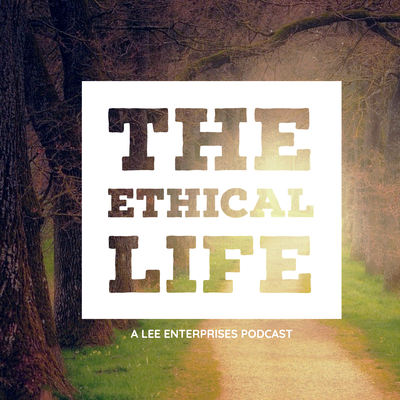
What can we do to retain friendships across political divides?
Episode 214: The killing of conservative activist Charlie Kirk sent shockwaves across the country, deepening fears that political violence is becoming an entrenched part of American life. While leaders on both sides rushed to cast blame, many ordinary citizens were left with a more practical concern: How can we continue living alongside one another when the divides seem sharper than ever?
Rather than revisiting the politics of the tragedy, hosts Richard Kyte and Scott Rada turn their attention to something both more personal and more universal: the fragile state of social bonds in an era of outrage.
The hosts ask whether trends like geographic sorting — liberals clustering in coastal cities, conservatives concentrating in rural towns — make communities stronger or weaker. They note how this “great sort” may bring comfort and solidarity, but also risks complacency, narrowing the space for neighbors to encounter genuine difference.
The conversation also tackles the culture wars over canceling and censorship. Kyte points out that both the left and right have embraced forms of speech suppression, often under different names. Whether labeled “cancel culture” or “censorship,” both carry the danger of driving unpopular ideas underground, where they often gain more power.
Instead, the hosts argue, persuasion and listening are the healthier alternatives. They highlight unusual pairings — like Ezra Klein and Ben Shapiro engaging in long, civil debate — as models for what’s missing in public life. Such exchanges may not change anyone’s core beliefs, but they can open space for understanding and reduce the tendency to see opponents as irrational or malevolent.
The episode also examines how everyday expressions of political identity — yard signs, slogans on T-shirts, bumper stickers — often do more to end conversations than start them. True free speech, Kyte suggests, isn’t just the right to declare one’s allegiance, but the freedom to ask sincere questions — the kind that can shift perspectives and rebuild trust.
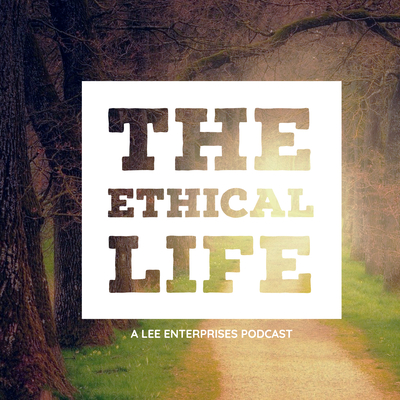
Why is community connection key to a good life?
Episode 213: What does it mean to live a meaningful life? That question is at the center of the latest episode of The Ethical Life podcast, hosted by Richard Kyte and Scott Rada.
The conversation begins with the story of a young kayaker who saved a stranger from drowning. Afterward, he reflected simply: “I was useful.” For Kyte, that statement underscores how rare it is for people to feel their actions truly matter. A sense of usefulness, he argues, is often more central to a fulfilling existence than money, entertainment or personal advancement.
The hosts extend the discussion to professions such as teaching and nursing. Many who enter these fields do so not for financial rewards but out of a desire to make a difference. The gratitude of students or patients can provide daily reinforcement that their work matters. Yet both hosts note that burnout is common, especially among those in underpaid or overstressed roles such as certified nursing assistants and home-health workers. Purpose matters, they conclude, but it cannot substitute for fair compensation and sustainable working conditions.
The episode also reaches back to philosophy. Kyte explains Plato’s “Allegory of the Cave,” in which prisoners mistake shadows for reality until one is freed to see the truth beyond. The metaphor, he says, reflects today’s challenges of distraction and distortion — whether through constant entertainment, doomscrolling or overreliance on artificial intelligence. Rada presses him on modern parallels, and both agree that meaning requires turning toward reality in the company of others.
The consequences of ignoring that truth are sobering. The FBI now uses the term “nihilistic violent extremism” to describe acts rooted in the belief that life is meaningless. While most people never reach such extremes, the hosts note that apathy, addiction and cynicism often grow from the same soil of disconnection.
Research, however, shows that small, intentional practices can counter these patterns. Habits shape character: generosity leads to gratitude, while constant online conflict fosters defensiveness. A meta-analysis of workplace wellness programs found that most initiatives —yoga, mindfulness, perks — had little effect. One exception stood out: volunteering. Companies that support service opportunities consistently see stronger morale and healthier cultures.
The conversation closes with a reminder that fulfillment is rarely found in isolation. Joining organizations, forming friendships and accepting responsibility for others provide daily opportunities to be useful in ways that matter.
This episode continues the show’s occasional series tied to Kyte’s lecture program, The Search for Meaning. All of those talks are available on YouTube.
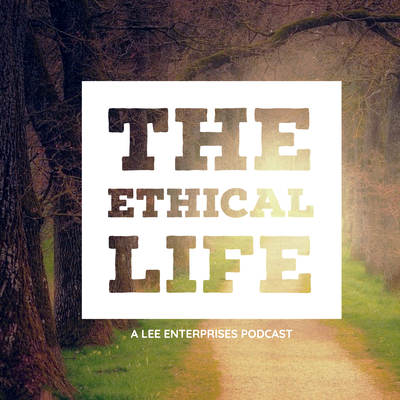
Is the internet’s next chapter making us lonelier?
Episode 212: Artificial intelligence has quickly moved from science fiction to everyday life, embedded in chatbots, search engines and social media feeds that billions of people use daily. Tech companies tout these tools as helpful assistants — capable of saving time at work, speeding medical research or even offering companionship. But a growing chorus of voices is asking whether the risks may outweigh the benefits.
Hosts Richard Kyte and Scott Rada discuss how chatbots are shaping relationships, education and mental health, and whether society is prepared for the consequences.
Kyte argues that artificial intelligence should be treated like a powerful drug or a complex machine — tightly controlled until its effects are understood. He points to parallels with opioids and defective automobiles, where profits were prioritized over safety until regulations forced accountability.
“We’ve invented something that can be tremendously useful, but we’ve given it to everybody without knowing the results,” Kyte says.
Rada pushes back, noting that past technologies — from the early internet to smartphones — were also greeted with skepticism before becoming indispensable. He shares a story about using artificial intelligence to transform a complicated data set into an easy-to-use dashboard. While that shortcut saved time, Rada admits it also sidestepped valuable learning. Is that trade-off harmless efficiency, or the loss of a skill we still need?
The episode also examines how companies design chatbots to be relentlessly affirming, a feature meant to keep users engaged but one that can lead to dangerous reinforcement of suicidal thoughts or disordered eating. Investigative reporting has revealed that some tech giants even suppressed research on child safety. For Kyte, those choices show why industry self-policing is not enough.
Links to stories discussed during the podcast
Meta suppressed research on child safety, employees say, by Jon Swaine and Naomi Nix, The Washington Post
ChatGPT to get parental controls after teen user’s death by suicide, by Gerrit De Vynck, The Washington Post
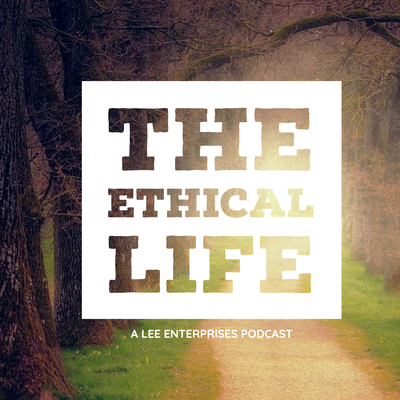
Can we rebuild trust when we can’t agree on facts?
Episode 211: In an era when misinformation spreads faster than facts, what does it mean to live truthfully — and why does it matter?
Hosts Richard Kyte and Scott Rada discuss the complicated role of truth in public life, personal relationships and digital spaces.
The conversation, inspired by Kyte’s new lecture series, “The Search for Meaning,” begins with a look at how truth has been understood since the time of Socrates. The Greek philosopher famously urged his followers to “know yourself,” warning that an unexamined life is not worth living. Kyte argues that the practice of questioning — and being questioned — is more essential than ever in a society awash in self-deception and confirmation bias.
But the discussion doesn’t stay in the ancient world. Rada and Kyte turn to today’s headlines, examining the turmoil at the Centers for Disease Control and Prevention, where political pressures and conflicting claims about vaccines have left many Americans unsure who to trust.
“We should be able to figure out who’s right,” Kyte says. “But too often, we can’t.” The result, they argue, is a dangerous erosion of confidence in institutions central to democracy.
The episode also considers how technology magnifies the problem. Social media algorithms, designed to keep users engaged, may serve up baseball highlights to fans harmlessly enough. But when those same mechanisms steer people toward partisan content, politics becomes entertainment — with cheering and booing replacing thoughtful engagement.
“That’s not a spectator sport,” Kyte said. “It’s people’s lives.”
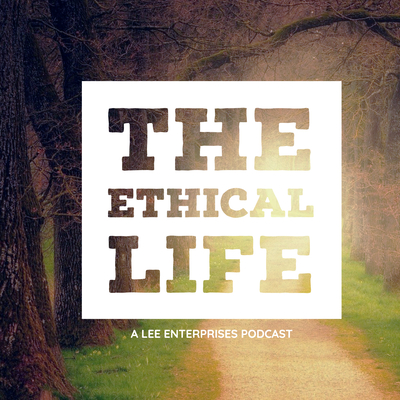
Can we reframe our past without sliding into self-deception?
Episode 210: Everyone has moments from the past they wish had unfolded differently. Some dwell on those memories, while others find ways to reinterpret them in order to move forward. But how far can people go in retelling their own stories before they risk losing sight of the truth?
Hosts Richard Kyte and Scott Rada begin the conversation with a simple piece of advice Rada found online — the idea that the past lives only in memory and can be reshaped. The phrase struck him differently than most internet platitudes, raising both curiosity as well as concern.
Kyte pushes back against the claim that the past exists only in perception. He points out that facts remain, regardless of how people interpret them. Using examples ranging from family disputes to the Woody Allen film “Crimes and Misdemeanors,” Kyte underscores the danger of self-deception and the temptation to absolve ourselves of responsibility by revising history.
Yet the discussion is not without hope. The hosts explore how changing perspective can help people heal. Forgiveness, they note, often requires reframing painful experiences in a way that releases the grip of bitterness. Examples from South Africa’s Truth and Reconciliation Commission and Rwanda’s post-genocide cultural performances illustrate how art and storytelling can create the distance needed for forgiveness to take root.
The episode also examines the challenges families face when siblings recall childhood in starkly different ways. While such differences can fuel conflict, they also highlight how memory is filtered through emotion, circumstance and personal growth.
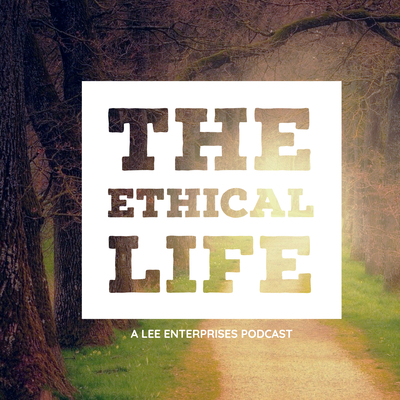
Are workplace relationships the key to finding meaning on the job?
Episode 209: Work has always been about more than deadlines, meetings and paychecks. The quality of our connections with colleagues often determines whether the office feels like a community or a cold, transactional environment.
Hosts Richard Kyte and Scott Rada explore the complex role that relationships play in shaping purpose, belonging and well-being in modern professional life.
Drawing on insights from psychotherapist and bestselling author Esther Perel, the hosts explore her four pillars of strong workplace connections: trust, belonging, recognition and collective resilience. They consider why these principles matter more than ever, at a time when many people socialize less outside of the office and rely on their jobs to provide a sense of community.
The hosts also debate whether structured tools — like question cards designed to spark conversation — can genuinely help colleagues build trust, or whether such efforts feel contrived. Along the way, they reflect on Kyte’s two decades of teaching courses on community building, offering practical examples of how leaders can foster camaraderie without resorting to blunt instruments.
The discussion also ventures into topics many organizations avoid, such as romance between coworkers. Is it ethical to discourage friendships and relationships at work simply because some may turn sour, or does connection outweigh those risks?
Technology looms large in the conversation. Remote and hybrid roles may boost productivity and employee satisfaction, but they often lead to reduced engagement and leave individuals feeling isolated. The hosts ask whether organizations have a responsibility to intentionally create opportunities for connection in an age where people may find screens more predictable than people.
Links to stories discussed during the podcast:
Employers place greater emphasis on social skills, Richard Kyte
Esther Perel on how technology is changing love and work, with podcast host Scott Galloway
7 questions that can instantly boost your work relationships, by Angela Haupt, Time
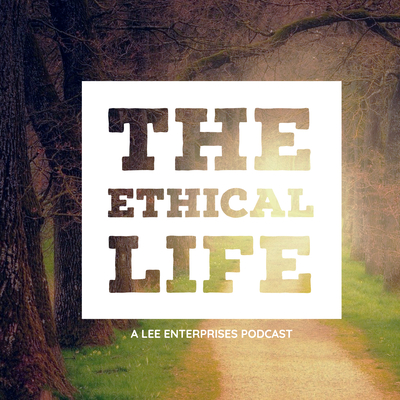
Do kids turn to phones because parents restrict their independence?
Episode 208: For years, experts and parents alike have debated how to get children off their devices. Limiting screen time, blocking apps and setting stricter household rules are common strategies. But what if the problem isn’t the technology itself but the loss of freedom to simply be a kid?
Hosts Richard Kyte and Scott Rada look at a revealing report from The Atlantic that asked children directly how they would spend less time online. The most common response was not more rules or stricter discipline — it was more unstructured play with friends, free from constant supervision.
The answers highlight a cultural shift. Over the past several decades, the independence once common for children — riding bikes across town, walking to the corner store or wandering through a local park — has steadily disappeared. Parents often cite safety concerns, and social norms reinforce the idea that letting kids roam is risky. Yet statistics show that many communities are actually safer today than in past generations.
The episode raises an uncomfortable possibility: children are not “addicted” to screens so much as they are starved for spaces where they can make choices and explore without adults hovering nearby. Smartphones, for all their flaws, offer at least the perception of autonomy. They allow young people to connect, interact and discover on their own terms — even if those experiences are shaped by algorithms.
